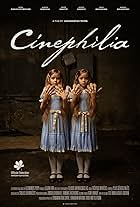Lithuania, late 1930s. As the heavy atmosphere in Europe forecasts the inevitable war, Geography scholar and researcher Feliksas Gruodis tries to contact big-wigs in politics and the press to tell them of his radical, inventive plan: to move Lithuania's 2,8 million population to Madagascar and build up a "back-up" ("Nova Lituania") country, in the ever more likely case the real Lithuania is invaded.
At home, things are equally tense: Feliksas's childless marriage is already falling apart, and now his cold, bitter wife brings in her tyrannical mother to live with them. As Feliksas's mother-in-law imperviously takes up literal and symbolic territory, he is forced to let go of his last bits of authority and move his precious African memorabilia to his jammed working place. Public and private oppression reinforces the flip side of the "Lebensraum" (vital space) concept, this time through the eyes of the invaded ones.
Karolis Kaupinis's directing debut is VERY impressive: excellent acting all around, gorgeous b&w cinematography and lighting, great job by the art direction and costume teams.
Kaupinis has a good ear for dialog as well: all the characters in Feliksas's home are build with economic precision and palpable tension. All the scenes between the President and the Prime Minister are beautifully written and performed. And the brief scene of a young lieutenant confronting the (now ex-) Prime Minister is thrillingly powerful.
However, there's a major rub in the structure: the potentially very interesting Prime-Minister character, who seems at first to be the protagonist until Feliksas takes over, sadly fades away into shapelessness and unimportance. Some of the scenes of the growing bond between them feel forced and ultimately pointless, such as the long sequence with the car on the beach.
I would also argue that Kaupinis's use of anachronistic elements in this very careful historical reconstitution don't always work. There is, for example, a long, crucial scene of dialog between Feliksas and the Prime Minister in a restaurant, to the background track of Los Záfiros 1960s haunting rendition of "Black Orpheus"'s Manhã de Carnaval/Canção de Orfeu. I mean, who can listen to any dialog, however well written, with Ignácio Elejalde's incomparable voice singing one of the most beautiful melodies ever written? Our ears are simply abducted away. I spent the whole scene thinking: is Feliksas a modern Orpheus and the Prime Minister his Eurydice or is it the other way around? Very distracting.
Anyway, these are minor and arguable issues: "Nova Lituania" is certainly worth your time and attention. There is real talent at play here, both behind and in front of the camera.

![Watch Trailer [OVS]](https://m.media-amazon.com/images/M/MV5BNTI5OGQ0ZTItMmNiMy00M2JhLWEwMDAtYTU3ZWVmM2VkODk4XkEyXkFqcGdeQXRyYW5zY29kZS13b3JrZmxvdw@@._V1_QL75_UX500_CR0,0,500,281_.jpg)
















